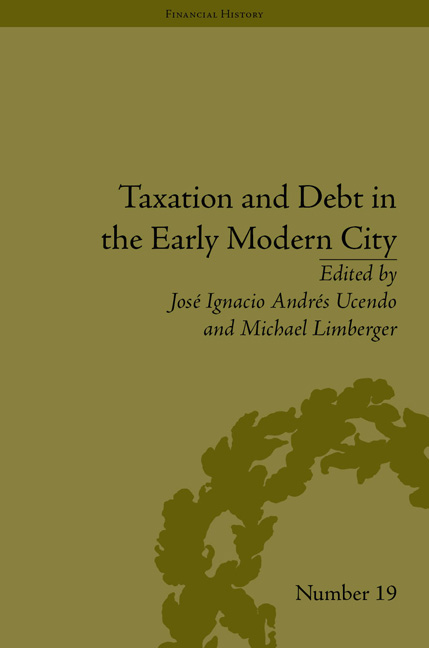Book contents
- Frontmatter
- CONTENTS
- Acknowledgements
- List of Contributors
- List of Figures and Tables
- Introduction
- 1 From Private to Public Management: Tax Farming and Customs Duties in Rome (1630–1700)
- 2 From Taxation to Indebtedness: The Urban Fiscal System of Milan during the Austrias Domination (1535–1706)
- 3 The Urban Tax System in the Kingdom of Naples (Seventeenth to Eighteenth Centuries)
- 4 Public Institutions, Local Politics and Urban Taxation in Seventeenth-Century Aragon
- 5 Taxation and Debt in the Early Modern Castilian Cities: The Case of Seventeenth-Century Madrid
- 6 Tax Collection in Spain in the Eighteenth Century: The Case of the ‘Décima’
- 7 Finances, the State and the Cities in France in the Eighteenth Century
- 8 The Making of the Urban Fiscal System of Antwerp until 1800: Excises, Annuities and Debt Management
- 9 The Dutch Financial System between Public and Private Interests: Urban Debt (1500–1700)
- 10 The Urban Fiscal System in the Habsburg Monarchy: The Case of the Austrian Hereditary Lands in the Sixteenth to Eighteenth Centuries
- 11 Taxation and Debt in Early Modern German Cities
- Notes
- Works Cited
- Index
7 - Finances, the State and the Cities in France in the Eighteenth Century
- Frontmatter
- CONTENTS
- Acknowledgements
- List of Contributors
- List of Figures and Tables
- Introduction
- 1 From Private to Public Management: Tax Farming and Customs Duties in Rome (1630–1700)
- 2 From Taxation to Indebtedness: The Urban Fiscal System of Milan during the Austrias Domination (1535–1706)
- 3 The Urban Tax System in the Kingdom of Naples (Seventeenth to Eighteenth Centuries)
- 4 Public Institutions, Local Politics and Urban Taxation in Seventeenth-Century Aragon
- 5 Taxation and Debt in the Early Modern Castilian Cities: The Case of Seventeenth-Century Madrid
- 6 Tax Collection in Spain in the Eighteenth Century: The Case of the ‘Décima’
- 7 Finances, the State and the Cities in France in the Eighteenth Century
- 8 The Making of the Urban Fiscal System of Antwerp until 1800: Excises, Annuities and Debt Management
- 9 The Dutch Financial System between Public and Private Interests: Urban Debt (1500–1700)
- 10 The Urban Fiscal System in the Habsburg Monarchy: The Case of the Austrian Hereditary Lands in the Sixteenth to Eighteenth Centuries
- 11 Taxation and Debt in Early Modern German Cities
- Notes
- Works Cited
- Index
Summary
The French cities, in spite of their charters of privilege, were neither city-states as in the Holy Roman Empire or the pillars of the political system as in the United Provinces, nor even administrative and regional centres, like in the decentralized monarchies such as England or Hapsburg Spain. Two great phases characterize the evolution of French towns during the early modern period. Until the personal reign of Louis XIV, the municipalities preserved great freedom to manoeuvre, since they were subjected only to control a posteriori by the Chambers of Accounts. As the size of their debt put in danger their role for the state finances, Jean-Baptiste Colbert imposed a financial framework by combining the clearing of their debts by partial bankruptcy with a strict regulation of their ordinary expenditure and the submission of the extraordinary expenditure to the preliminary authorization by the intendants, who were direct representatives of the central government in the provinces. However, this policy, characteristic of the absolutist perspective of the royal state, made neither the budget deficits nor the recourse to debt disappear in the eighteenth century.
The municipalities, doubly defined as representative and royal institutions, were to render at the same time the services expected by the urban community to guarantee social peace and to fulfil the financial and military requirements of the state.
- Type
- Chapter
- Information
- Taxation and Debt in the Early Modern City , pp. 111 - 130Publisher: Pickering & ChattoFirst published in: 2014



